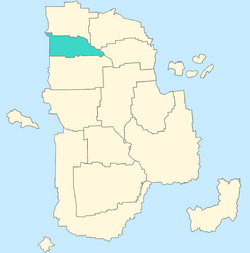Burberry (Arabi)
Burberry | |
|---|---|
| State of Burberry | |
 Map of Arabi with Burberry highlighted | |
| Country | Arabi |
| Admitted | November 19, 1838 (10th) |
| Capital (and largest city) | Galveston |
| Government | |
| • Governor | George Atkins (R) |
| • Lieutenant Governor | Robert Ball (R) |
| Legislature | General Court |
| • Upper house | Burberry State Senate |
| • Lower house | Burberry Assembly of Delegates |
| Arabin Senators | Poppy Smith (D) Robert Nelson (R) |
| Arabin House delegation | 2 Republicans 2 Democrats List
|
| Population (2020) | |
| • Total | 1,441,781 |
| • Rank | 15th |
| Demonym(s) | Burberite |
| Time zone | UTC−04:00 (AST) |
| • Summer (DST) | UTC−03:00 (ADT) |
| Area code | 429 |
| Abbreviation | BU |
Burberry is a state in northern Arabi. It is bordered by Terranova to the north, Windsor to the north-west, Saint George to the west, and Severn to the south. Of the sixteen Arabin states, Burberry is the 13th-largest by are, and with a population over one million, the fourteenth most populous. Burberry became the tenth state when it ratified the constitution on November 19, 1838.
History
2000 Corwick shooting
On September 1, 2000, at 3:34 pm ADT, John Tyler Perry, a 27-year-old elementary school teacher, went to Midtown Cafe in downtown Corwick where his ex-girlfriend, Marissa Townsend, worked. Perry grabbed his AK-74 from the trunk of his car, walked into the cafe, and began shooting. He shot and killed 13 people, including Townsend, and injured four others. After the shooting, he barricaded himself inside the cafe and held the remaining customer's hostage. While locked inside the building, Perry dialed the local police to request his demands. When the police dispatcher asked him why he shot up the store, he said, "she cheated on me, she cheated on me and left me for my best friend, now he knows what it's like to lose someone you love." After several hours of conversations with a hostage negotiator, Perry let the hostages free. After all of the hostages were released, police heard a gunshot from inside the shop. When they entered the building, they did not find Perry or his gun. A nationwide KALOF (keep a lookout for) was issued for Perry. Police found Perry six hours later at Old Clark City International Airport in New Cambridge trying to board an airplane headed to Moscow. He was arrested and charged with homicide and aggravated assault with a deadly weapon. Perry was found guilty on thirteen counts of homicide and four counts of aggravated assault with a deadly weapon. He was convicted on November 16, 2000, and sentenced to 50 years in prison without the possibility of release. After his sentencing, the judge asked him if he was remorseful for his action's to which he nodded his head no.
On September 1, 2001, the first anniversary of the shooting, the 82nd Congress passed the Marissa Townsend Assault Weapons Ban Act which banned all assault weapons that take lives en masse. They implemented a governmental buyback program that required citizens to turn their assault weapons over to the government for a flat fee of $200 per weapon.
The Supreme Court ruled on February 12, 2003, that the Marrisa Townsend Assault Weapons Ban Act does not violate the constitution due to the second amendment not specifying what type of arms citizens may have. Chief Justice Robert Kirby wrote the majority and said,
"The second amendment guarantees every citizen of legal age the right to keep and bear arms, however in reviewing this case we, the court, ruling unanimously, have concluded that the Marissa Townsend Assault Weapons Ban Act does not violate the constitutional right to keep and bear arms. During the time when the second amendment was written and passed, assault weapons designed to take lives en masse did not exist and we firmly believe if this was the case, the second amendment would have specified which type of weapons citizens were allowed to possess. We, the Supreme Court of Arabi, being the highest court in the Nation stand by our decision and consider this case closed and decided."